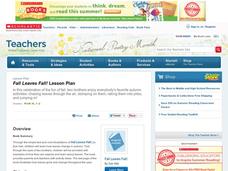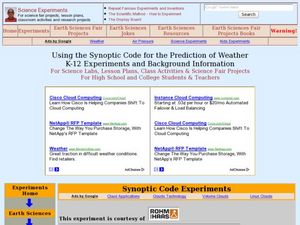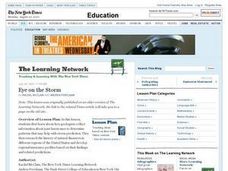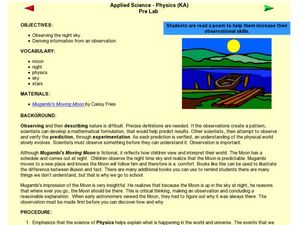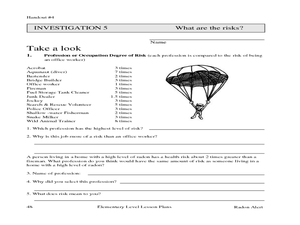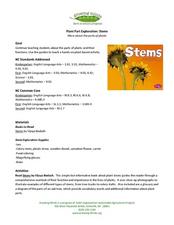Curated OER
Fall Leaves Fall! Lesson Plan
Students discover facts about leaves. In this early childhood lesson plan, students identify different types of leaves, and make predictions about which types of leaves they think they will find in their community. Students collect...
Curated OER
Sink or Float
First graders explore items that sink or float. They cut and glue pictures of objects that they predict will sink or float. Students place thir pictures on a picture of a bucket of water. Students then color the objects that they had...
Curated OER
Push or Pull
Students examine a large box and determine how they may move the box to a specified point. After the class makes predictions, they test them and decide what worked and what didn't work. Through their tests, push and pull are introduced....
Curated OER
The Frog and the Ol' Black Fly
Students explore frogs. For this cross curriculum literacy and frogs lesson, students predict the plot and then listen to the book The Wide-Mouthed Frog by Keith Faulkner. Students define "predator" and identify foods a frog might eat. ...
Curated OER
Weaving Weather Maps with the World Wide Web
High schoolers access the Internet and use real time data from the American Meteorological Society to create a detailed weather map. They make weather predictions based on the data collected.
Curated OER
Using the Synoptic Code for the Prediction of Water
Students construct a thermoscreen for the experiment. In this earth science lesson, students make observations and interpret them using synoptic codes. They predict the weather based on gathered information.
Curated OER
Eye on the Storm
Students discover the way geologists collect information about past hurricanes to determine patterns that may help with storm prediction. They then research the history of natural disasters in different regions of the United States and...
Curated OER
Using the Synoptic Code for the Prediction of Weather
Students interpret the synoptic code. They construct a thermoscreen with an anemometer. Students identify different types of clouds and understand and read barometric pressure. Students predict weather pattern as they apply to fronts.
K12 Reader
Meteorologists
Meteorologists and the tools they use are the subject of a reading comprehension worksheet that asks kids to read the attached article and respond to a series of comprehension questions.
Institute of Electrical and Electronics Engineers
Insulators and Conductors
In a classic activity, emerging electricians test various objects for electrical conductivity in a circuit. Each group constructs a simple circuit by following a diagram. Predictions are made and objects are inserted into the circuit,...
Teach Engineering
Combustion and Air Quality: Emissions Monitoring
Help your class determine the types of pollutants coming from vehicle exhaust. Groups use an air quality monitor to determine the emissions from different vehicles, to gain knowledge about combustion energy, and to predict how the...
Howard Hughes Medical Institute
Gorongosa: Scientific Inquiry and Data Analysis
How does the scientific process begin? Introduce ecology scholars to scientific inquiry through an insightful, data-driven lesson. Partners examine data from an ongoing research study to determine the questions it answers. The resource...
K12 Reader
What’s the Forecast?
A reading comprehension passage is illustrative for both language arts and earth science skills. Using context clues, learners find out how to predict the weather using various tools. They then answer five reading questions about what...
Howard Hughes Medical Institute
Ocean Acidification
Human impacts on the environment can sometimes be difficult to measure, especially under water! An activity centered on ocean acidification gives science scholars the opportunity to examine the effects of carbon dioxide on marine life....
Learning Games Lab
Scientific Graph Reading
Interpreting graphs is an essential skill for young scientists. An interactive online lesson gives individuals an opportunity to review the components of a graph and learn to read and interpret the shape of a graph. The lesson includes...
K12 Reader
What Is Gravity
This cross-curricular reading comprehension worksheet asks kids to read a short passage about gravity and then to answer questions about the article.
Curated OER
Cloudy Days are for Reading and Writing
Students research weather proverbs and determine the scientific validity of 3 weather proverbs. They write an essay presenting their reasoning. They interview elderly people to graph the most frequently heard proverbs and theorize...
Curated OER
Chilling Predictions
Young scholars research and prepare an almanac on the Arctic. They examine the laws that attempt to provide jurisdiction over this area and consider how these laws be affected if geography of the Arctic continues to change due to global...
Teach Engineering
Density Column Lab - Part 2
Groups suspend objects within layers of liquids to determine the densities of different liquids and compare them to the densities of objects calculated in Part 1. The groups then carefully test their calculations by layering the liquids...
Have Fun Teaching
Growing Seeds (9)
A seed, water, and sunlight. A seed, water, but no sunlight. A seed, sunlight, but no water. Young biologists are ask to infer what will happen to seeds given five different growing conditions.
Curated OER
Poetry and Observations
Students compare poetry and the night sky. In this poetry lesson plan, students read poetry and compare the imagery from the poem with the night sky. Students explore how science and poetry relate to one another.
Curated OER
Radon Alert: Understanding Odds
In this radon alert: understanding odds worksheet, 5th graders predict results of rolling dice and record data in a chart, then compare odds of events and occupations, then compare that with radon exposure.
Curated OER
Plant Part Exploration: Stems
Explore water transport in plant stems using this fun experiment! Your scientists will start by reading Stems by Vijaya Bodach. Then, activate prior knowledge about plant stem functions and water transportation. Demonstrate this concept...
Curated OER
Making Paper
Students explore paper making. In this cross curriculum multicultural ecology and art lesson, students follow written and oral instructions to make paper using common household items. Students predict the amount of paper use in their...
Other popular searches
- Making Predictions Reading
- Predictions in Reading
- Making Predictions in Reading
- Reading Prediction Strategy
- Predictions Before Reading
- Reading Prediction Outcome
- Reading Prediction Skills
- Making Prediction in Reading
- Guided Reading Predictions
- Predictions Reading
- Prediction in Reading
- Prediction Reading


